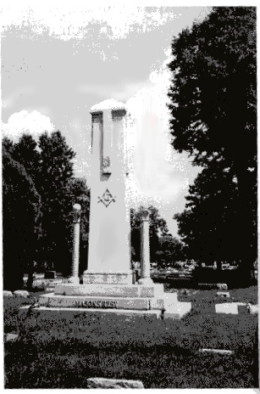www.FranzosenbuschHeritageProject.org Home
OAK RIDGE CEMETERY
"The Abbey" Mausoleum at Oak Ridge. This photograph is from the 1920s. The original photograph hangs in the Oak Ridge office.
There are several famous people who rest at the Oakridge Cemetery:
Harold Lincoln Gray (1894-1968), a local suburban boy who created Li'l Orphan Annie, established his heroine on the pages of the Chicago Tribune.
Musician Chester A. "Howlin' Wolf" Burnett (1910-1976), rests here after nearly 70 years of hard living. Originally from Mississippi, Howlin’ Wolf's began his musical experience by singing in church on Sundays. In his eighteenth year is father presented Chester with a guitar. Soon, Chester met Charley Patton, a Delta Blues pioneer. Under his tutelage, Chester learned Patton's style and methods.
For several years Chester perfected his skills at local weekly fish fries while spending his days farming with his family. Chester met another Delta Blues performer, Sonny Boy Williamson, after moving to Arkansas. Williamson taught him the harmonica. Soon Chester quit farming and went on the road. Chester wandering and four years in the service brought him back to farming but his heart wasn't in it. He formed his own band and went back on the road.
Chester experienced good success in Mississippi and Arkansas. At 38 he landed a radio spot in West Memphis and had his big breakthrough. His fame grew and, in 1950, led to a recording contract with Chicago's Chess Records for his versions of "How Many More Years" and "Moanin' at Midnight." With record sales of over 60,000, RPM began competing with Chess for Wolf's recordings. Chess won. And Chess, Chester, and the Chicago Blues scene became entwined.

At 6 feet 6 inches and nearly 300 pounds, with an earth-shaking voice punctuated by gut-wrenching moans and wails, Chester Burnett had become a performer known for scaring audiences out of their wits. In the years since his debut, he has been credited by hundreds of musicians, representing countless countries and musical styles, as a major influence on their work.
Chester continued his popular performances throughout his later years in spite of a kidney problem, receiving dialysis before beginning his engagements. He died in Chicago, the town that loved him well, on January 10, 1976.
Sources were used in the compilation of this entry include but are not limited to:
Graveyards of Chicago by Matt Hucke and Ursula Bielski -- a book which describes all the Chicago area cemeteries.
Last Modified: 09/14/2005